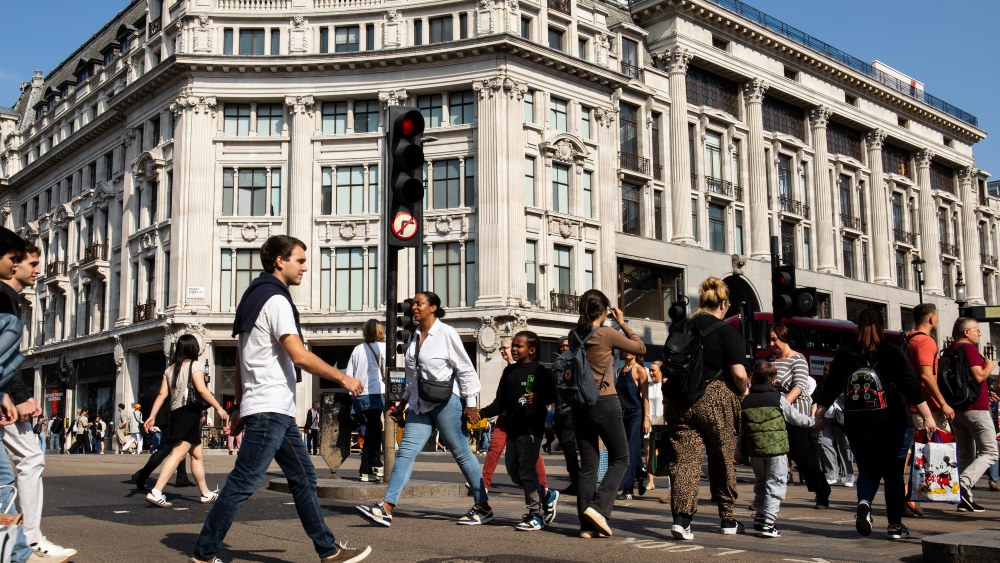LONDON — Christmas brought little cheer to British retailers, and the new year isn’t looking much better as businesses brace for an onslaught of new taxes and spooked consumers tighten their purses.
According to the latest figures from the British Retail Consortium, the three-month run-up to Christmas known as the “golden quarter” was disappointing, with sales inching up 0.4 percent year-on-year.
Retailers had been hoping for a Christmas boost following a difficult 2024 that saw total retail sales rise 0.7 percent year-on-year. In the 12 months, sales of food rose 3.3 percent, while non-food sales declined 1.5 percent.
Helen Dickinson, chief executive officer of the BRC, described 2024 as a “challenging year marked by weak consumer confidence and difficult economic conditions.” She said the crucial “golden quarter” failed to give 2024 the send-off retailers had been hoping for.
Although non-food was particularly hard-hit in 2024, there were some bright spots, with beauty products, jewelry and electricals delivering strong sales during the Christmas season.
The outlook for 2025 is modest, with the BRC expecting sales growth to average 1.2 percent, below the projected shop price inflation of 1.8 percent.
Dickinson said those numbers mean that sales volumes are likely to fall this year — and at the worst possible time.
She said new packaging levies coupled with the Labour government’s new raft of business taxes and employee protection laws will increase retailers’ costs by 7 billion pounds.

Shoppers on New Bond Street in London.
Manuel Valcarce/WWD
“With little hope of covering these costs through higher sales, retailers will likely push up prices and cut investment in stores and jobs, harming our high streets and the communities that rely on them. Government must find ways to mitigate this,” she said.
As reported, the Labour government’s first budget, which takes effect in April, is a brutal one filled with 40 billion pounds in tax hikes targeted mainly at small and medium-sized private businesses, the middle classes, and the very wealthy.
The new budget will see a substantial increase in the minimum wage and to National Insurance payments, which businesses make to the state on behalf of employees.
Not surprisingly, business confidence is low, and companies have already begun laying off workers, and putting projects and investments on hold.
In the same BRC report, Linda Ellett, U.K. head of Consumer, Retail & Leisure at KPMG, said retailers’ lackluster performance in the final three months of 2024 reflected “the ongoing careful management of many household budgets during a time when many costs remain at a heightened level compared to past years.”

A look from the Next plc spring 2025 campaign.
In response to the difficult environment, retailers will be sharpening their approach to selling in 2025.
“We will see retailers increasingly using customer data and AI technology to deliver increased personalization when it comes to targeting products and offers to their current, and potential, customers,” Ellett added.
In a separate report, also issued Tuesday, the British high street giant Next plc said consumer behavior is changing quickly.
Next, which sells clothing, accessories and home furnishings, said consumers are buying fewer entry-level products and more items at the middle and top end of the price pyramid.
“To be clear, consumers are not necessarily spending more overall, but buying fewer, marginally more expensive items. We believe that this trend will continue into next year. So we expect the overall average selling price of our goods to increase by more than 1 percent, which will deliver labor cost savings across the business,” said Next.

Inside the Next plc store in Watford, England.
Next, one of the few British retailers that has managed to survive, and thrive, in a difficult environment, said it plans to offset around 13 million pounds of wage costs through a planned 1 percent price hike, “less than the Bank of England’s target for inflation of 2 percent.”
Next outlined its savings plans as it posted a set of positive results for the current year, and an upbeat forecast for fiscal 2025/26.
The company bucked the Christmas trend and said that in the fourth quarter ended Dec. 28, full-price sales rose 6 percent year-on-year compared to previous guidance of 3.5 percent.
The unexpected bounce led Next to increase its full-year guidance for group profit before tax by 5 million pounds to 1.01 billion pounds, 10 percent higher than last year.
For fiscal 2025/26, full-price sales growth is forecast to be up 3.5 percent, with group profit before tax forecast to rise 3.6 percent to 1.05 billion pounds.
Shares in Next, a FTSE 100 company, rose nearly 4 percent on Tuesday to close at 99.12 pounds.

